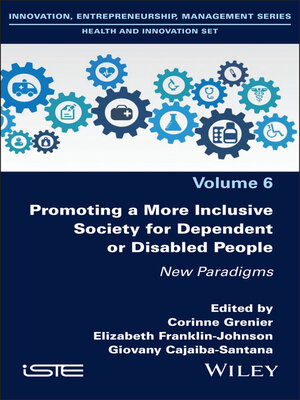Promoting a More Inclusive Society for Dependent or Disabled People
ebook ∣ New Paradigms · ISTE Invoiced
By Corinne Grenier

Sign up to save your library
With an OverDrive account, you can save your favorite libraries for at-a-glance information about availability. Find out more about OverDrive accounts.
Find this title in Libby, the library reading app by OverDrive.



Search for a digital library with this title
Title found at these libraries:
| Library Name | Distance |
|---|---|
| Loading... |
Promoting a more inclusive society for the elderly, people with disabilities and, more broadly, all of those in vulnerable situations, implies profound changes in the healthcare system in many countries.
This movement, known as "deinstitutionalization", implies strengthening people's participation in the decisions and activities that concern them, whether they live in an institution, in their ordinary environment, or in respect to their habits and life projects. The aim is to achieve social participation by considering the people we support as partners in our organizations, as genuine professional and institutional players who contribute to this transformation of the healthcare system.
This book brings together contributions from over 40 researchers from different countries (notably French-speaking and Canadian), as well as patients involved in research, experimentation or associations. These contributions examine the terminological and legal foundations of a more inclusive society – the different mechanisms, innovative forms of housing and ways of supporting the public and professionals in favor of inclusion – and the different models for animating territories, therefore fostering the community commitment of favoring inclusion.
This movement, known as "deinstitutionalization", implies strengthening people's participation in the decisions and activities that concern them, whether they live in an institution, in their ordinary environment, or in respect to their habits and life projects. The aim is to achieve social participation by considering the people we support as partners in our organizations, as genuine professional and institutional players who contribute to this transformation of the healthcare system.
This book brings together contributions from over 40 researchers from different countries (notably French-speaking and Canadian), as well as patients involved in research, experimentation or associations. These contributions examine the terminological and legal foundations of a more inclusive society – the different mechanisms, innovative forms of housing and ways of supporting the public and professionals in favor of inclusion – and the different models for animating territories, therefore fostering the community commitment of favoring inclusion.







